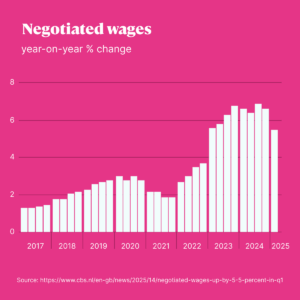This content was originally featured in our quarterly client newsletter. Subscribe here to get the next issue directly in your inbox.
As a recruitment agency with nearly three decades of experience and daily contact with hiring managers across the Netherlands, we’ve had a front-row seat to the shifts shaping the Dutch labour market in 2025.
Through our conversations with employers, candidates, and HR leaders, we’re seeing clear trends emerge. Here’s what we’ve been observing, and what these trends mean for employers planning to scale their teams.
Hiring has slowed, but the market remains tight
The number of job vacancies in the Netherlands fell by 3.3% since Q4 2024. While demand for talent is easing slightly, competition for qualified candidates, especially multilingual and technical professionals, remains high.
Companies are slowing hiring mainly due to:
-
Higher wages and rising candidate expectations of benefits
-
Rising costs and inflation
-
Increased focus on retention rather than growth

Salaries continue to rise
Despite the hiring slowdown, wages in the Netherlands grew by 5.5% in Q1 2025 compared to the same time last year, though the rise has slowed down in Q3 of 2025.
The information and communication sector saw the biggest jump, while education and public administration experienced the least growth.
Salary benchmarks are shifting fast. If your pay scales haven’t been updated since early 2024, you may already be below market rate, particularly in tech and digital roles.
To stay competitive:
-
Review your salary structure and ensure you can stay competitive
-
Consider other benefits like hybrid work, training budgets, and mental health support.
-
Be transparent about compensation early in the recruitment process — candidates expect it.

AI adoption is transforming the workplace
Companies in the Netherlands now use an average of seven different AI tools across departments — from recruitment and HR to marketing and finance.
AI is improving efficiency, but also creating new challenges:
-
Skills gap: Employees need upskilling in data literacy, automation, and AI governance.
-
Ethical and compliance risks: Hiring managers must ensure AI screening tools are transparent and bias-free.
-
Role redesign: As automation grows, job descriptions are evolving, requiring HR to rethink competencies, not just titles.
For hiring teams, AI offers faster shortlisting and better insights.

Job switching is decreasing
“Job Hoppers” are not as hoppy anymore. Workers with direct contracts are increasingly likely to stay with their current employer, even when offered new opportunities.
This “stickiness” suggests candidates are prioritising:
-
Stability
-
Predictable income and pension security
-
Employers who invest in their growth
For employers, this means retention strategies are as important as hiring ones. Exit interviews, internal mobility programmes, and clear development pathways can help keep top talent.

New labour laws coming into effect in 2026
From 1 January 2026, several changes to Dutch employment law will take effect.
Equal rights for temporary workers
Temporary staff will be entitled to the same working conditions as permanent employees, including pay and benefits. A new pension scheme will also apply.
Adams Multilingual Recruitment has been ABU certified for +20 years. We are equipped to provide you with temporary workers, while staying completely compliant with Dutch labour law and the CLA, now or in the future.
Penalties for false self-employment
Companies that misclassify employees as freelancers or contractors could face financial penalties. Reviewing your contracts and freelancer agreements in 2025 will help avoid compliance risks.
Higher taxes on carried interest income
So-called “lucrative interest” income will be harder to shift into lower tax brackets, closing existing loopholes. This mainly affects investors and senior executives with performance-based pay structures.
What this means for employers in the Netherlands
Employers should budget carefully, taking into account rising wages and upcoming compliance costs, while also focusing on retention as employees are increasingly choosing to stay with their current employers. It’s important to review all freelance, temporary, and direct contracts ahead of the 2026 labour law changes to ensure compliance.
At Adams Multilingual Recruitment, we help companies navigate these shifts — finding, hiring, and retaining multilingual professionals across the Netherlands. If you’re planning to grow your team in 2026, let’s talk about how we can help you succeed.






